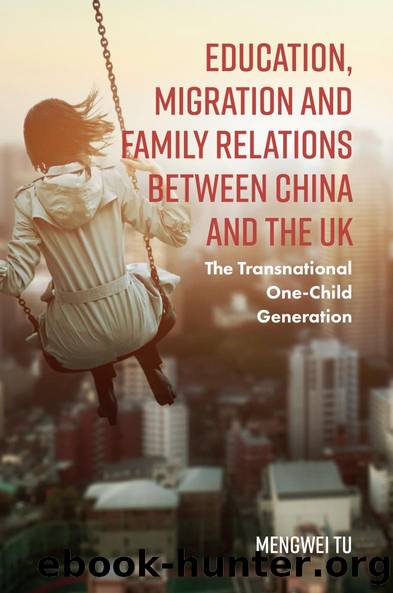Education, Migration and Family Relations Between China and the UK by Mengwei Tu

Author:Mengwei Tu [Tu, Mengwei]
Language: eng
Format: epub
ISBN: 9781787548657
Barnesnoble:
Publisher: Emerald Publishing Limited
Published: 2020-10-23T00:00:00+00:00
Table 5: Parental involvement in the study-abroad decision.
Parental Involvement in the Decision to Study Abroad
Non-One-Childa
One-Child
Initiated by parents
0
10
Ambiguous decision process
0
â6
Initiated by child and supported by both parents
2
â9
Initiated by child but opposed by at least one parent
3
â2
aOne non-one-childâs migration was entirely planned by the older sibling, thus it is not included in the table.
As is shown in Table 5, the majority of parents fully supported their child(ren)âs going abroad (in most cases study abroad). Acting as the financial resource provider for their child(ren)âs overseas study6 was the most direct and common way for parents to support their child. There was a sense of taken-for-grantedness among child and parent respondents that parents should pay for the childâs overseas education.7 Parents who were the migration initiators tended to have a higher income and a higher level of education. Nevertheless, parents who were relatively less well-off also funded their childâs study abroad in response to the childâs initiative.
In the case of the least well-off one-child family where the parents were both factory workers, Bolinâs mother recalled the day when her daughter said that she wanted to study for a Masterâs degree abroad:
My first response was, how much money? We didnât have much savings. So how much was our flat worth?⦠I borrowed bit by bit from relativesâ¦I just thought, if she wants to study, then I must support her education ⦠my daughter always knew Iâd support her study no matter what.
The possibility of a student loan from banks or other institutions was absent from this cohortâs decision-making. This was partly to do with the lack of an established student loan system in China and the lack of student loan experience among Chinese families. Moreover, the emphasis on education in the traditional Confucian culture has been to place the family as the prime supporter for its membersâ education (Bodycott, 2009, Fong, 2004, Mazzarol & Soutar, 2002).
The willingness of parents to invest in their childrenâs education was not exclusive to Chinese parents. Students from other East Asian countries like Japan and South Korea, funded by their parents, also make up a significant part of international students in Western universities. Although education has been perceived as important for an individualâs socioeconomic mobility in most countries, the Confucian Asian societies place a particular emphasis on the value of education for the family. Thus, gaining entrance to a high-status university is not only the individualâs achievement, but it is also a success for the family and the failure to obtain such value would bring shame to the family. Therefore, the âpractical and economic value of education, in conjunction with the value placed on family success, has traditionally provided a strong motivation for families to invest heavily in the education of their childrenâ (Choi & Nieminen, 2013). Following this argument parents are expected to support their childrenâs education as much as they can in order to meet the culturally assigned obligations.
Such cultural factors are likely to contribute to the taken-for-grantedness of the parental financial role found in the study abroad decision among the respondents.
Download
This site does not store any files on its server. We only index and link to content provided by other sites. Please contact the content providers to delete copyright contents if any and email us, we'll remove relevant links or contents immediately.
| Anthropology | Archaeology |
| Philosophy | Politics & Government |
| Social Sciences | Sociology |
| Women's Studies |
Cecilia; Or, Memoirs of an Heiress — Volume 1 by Fanny Burney(32546)
Cecilia; Or, Memoirs of an Heiress — Volume 2 by Fanny Burney(31943)
Cecilia; Or, Memoirs of an Heiress — Volume 3 by Fanny Burney(31929)
The Great Music City by Andrea Baker(31916)
We're Going to Need More Wine by Gabrielle Union(19034)
All the Missing Girls by Megan Miranda(15951)
Pimp by Iceberg Slim(14487)
Bombshells: Glamour Girls of a Lifetime by Sullivan Steve(14054)
For the Love of Europe by Rick Steves(13905)
Talking to Strangers by Malcolm Gladwell(13346)
Norse Mythology by Gaiman Neil(13345)
Fifty Shades Freed by E L James(13232)
Mindhunter: Inside the FBI's Elite Serial Crime Unit by John E. Douglas & Mark Olshaker(9318)
Crazy Rich Asians by Kevin Kwan(9277)
The Lost Art of Listening by Michael P. Nichols(7490)
Enlightenment Now: The Case for Reason, Science, Humanism, and Progress by Steven Pinker(7306)
The Four Agreements by Don Miguel Ruiz(6744)
Bad Blood by John Carreyrou(6611)
Weapons of Math Destruction by Cathy O'Neil(6264)
